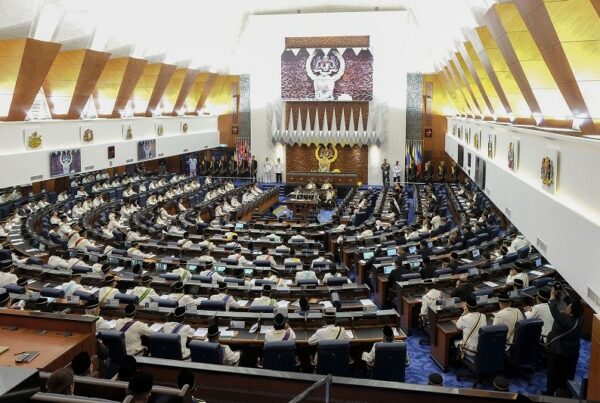15 September 2024
As Malaysia celebrates her 61st birthday, Projek SAMA (Project for Stability and Accountability for Malaysia) proposes an immediate increase of 15 extra seats each in the Dewan Negara (House of Senate) for Sabah and Sarawak, to immediately ensure a one-third veto power for East Malaysia to block any unilateral constitutional amendments by the West Malaysian states and territories.
As per Article 45 of the Federal Constitution, the Senate currently has 70 members, with two members each elected by the legislatures of Sabah and Sarawak, and another federally appointed member representing the Federal Territory of Sabah, amounting to a mere 4.29%.
Additional 30 senators from Sabah and Sarawak would immediately give East Malaysia (including Labuan) a total of 35 seats in an expanded Senate with 100 members, exactly 35%, hereafter the ‘Dewan Negara 35/100’ proposal. (Table 1)
Table 1: The ‘Dewan Negara 35/100’ Proposal
| Method of Selection | States/ FederalTerritories | ExistingNumbers | % | ProposedAddition | NewTotal | % |
| Election byStateLegislature | Sabah | 2 | 2.9% | 15 | 17 | 17.0% |
| Sarawak | 2 | 2.9% | 15 | 17 | 17.0% | |
| Appointmentby YDPA | FT Labuan | 1 | 1.4% | – | 1 | 1.0% |
| Election byStateLegislature | West Malaysia Statesand FTs | 25 | 35.7% | – | 25 | 25.0% |
| Appointmentby YDPA | Non-geographicalRepresentatives | 40 | 57.1% | – | 40 | 40.0% |
| Total | 70 | 100.0% | 30 | 100 | 100.0% | |
We call upon all parties supportive of a constitutional veto power by East Malaysia to support this proposal and the amendment of Article 45 so that this goal can be attained in the next parliamentary session that starts on 14 October. When Parliament convenes again in next March, the veto power is already a reality.
Here are the three advantages of the ‘Dewan Negara 35/100’ proposal over the complicated yet ambiguous demand for 35% representation for both states in Dewan Rakyat (hereafter the ‘Dewan Rakyat 35%’ demand).
Realisable before GE16
Firstly, Dewan Negara 35/100 can be done with simply amending Article 45, without any complication. As the Madani Government now commands a two-third majority, it can carry it through without obstacles. Likewise, Perikatan Nasional (PN) will support it unless they oppose to the fundamental idea of having an East Malaysian veto bloc. More detailed reform on the Senate can follow after this 35/100 formula is passed.
In contrast, the ‘Dewan Rakyat 35% demand’ may not be realised in time for the 16th General Election, which must be held latest by February 2028. It needs to go through three stages: negotiation between government parties on the total and allocation of seats for all states, the amendment of Article 46 which may become a prolonged debate, constituency delimitation that may take up two years.
Since no normal constitutional amendments can be passed without a two-third support in either Dewan Negara or Dewan Rakyat, it would make more sense for East Malaysians to secure their veto power early through this straightforward Dewan Negara 35/100 proposal, as Malaysian politics changes rapidly.
No Bloating Parliament
Secondly, the East Malaysia veto power can be achieved with a mere increase of 30 senators, much more accepted by the public. In contrast, the ‘Dewan Rakyat 35% demand’ may produce a bloated parliament.
Its proponents have not presented a specific plan on how this 35% representation may be achieved, promising polemics. Safe to say, it is impossible for West Malaysian MPs to agree to take away 21 seats from West Malaysia to be given to East Malaysia, or even increasing seats only in East Malaysia when many West Malaysian constituencies exceeding 200,000 voters. If equal number of seats is added to both East and West Malaysia as a compromise, then Dewan Rakyat would be bloated with a total of 360 seats.
Table 2: Three Scenarios of the ‘Dewan Rakyat 35%’ Demand
| Scenario | West Malaysia | East Malaysia | Malaysia |
| Status Quo | 165 | 57 | 222 |
| Keeping the total at222 | 144 | 78 | 222 |
| (-21) | (+21) | (0) | |
| Only increase in East Malaysia | 165 | 89 | 254 |
| (+0) | (+32) | (+32) | |
| Increase in both East and WestMalaysia | 234 | 126 | 360 |
| (+69) | (+69) | (+138) |
Without parliamentary reforms to deliver better quality in lawmaking and policy scrutiny, Malaysians would reject job creations for politicians at such colossal scale.
Affirmation of East Malaysia’s Special Status
Thirdly, the ‘Dewan Negara 35/100’ proposal would confirm the veto power of East Malaysia – Sarawak, Sabah, and Labuan – which is an enhancement as compared to the Malaysia Agreement 1963 (MA63) which did not promise veto power for Sabah, Sarawak, and Singapore, as wrongly claimed by many.
The over-representation of Sabah and Sarawak in Malaysia’s first parliament, capped at 15% and 10% respectively, was promised only in in the Inter-Governmental Committee (IGC) report in 1962, neither linked to the seats of Singapore nor stated as part of the veto power. Most critically, the promise has constitutionally terminated by end of August 1970, as per Article 161E(2)(e) of the Federal Constitution.
The ‘Dewan Negara 35/100’ proposal would be a firm manifestation of Sabah and Sarawak as special regions within the Federation of Malaysia in line with the democratic norm. In federalism, the Senate is commonly made the house of state rights, and over- representation and veto power for less populated or special states are justified.
Issued by:- Projek SAMA

